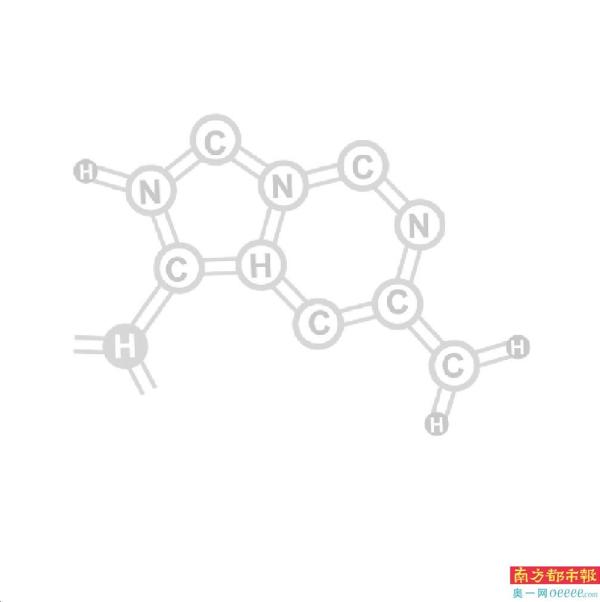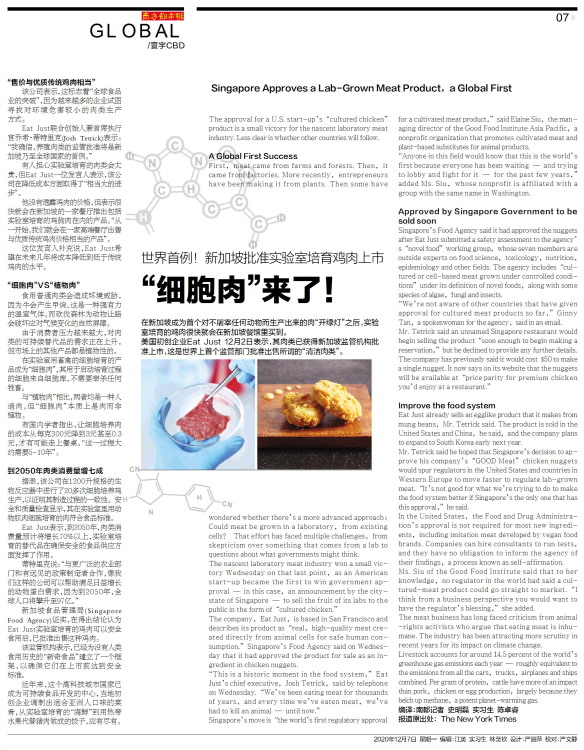


在新加坡成为首个对不屠宰任何动物而生产出来的肉“开绿灯”之后,实验室培育的鸡肉很快就会在新加坡餐馆里买到。
美国初创企业Eat Just 12月2日表示,其肉类已获得新加坡监管机构批准上市,这是世界上首个监管部门批准出售所谓的“清洁肉类”。
“售价与优质传统鸡肉相当”
该公司表示,这标志着“全球食品业的突破”,因为越来越多的企业试图寻找对环境危害较小的肉类生产方式。
Eat Just联合创始人兼首席执行官乔希·蒂特里克(Josh Tetrick)表示:“我确信,养殖肉类的监管批准将是新加坡乃至全球国家的首例。”
有人担心实验室培育的肉类会太贵,但Eat Just一位发言人表示,该公司在降低成本方面取得了“相当大的进步”。
他没有透露鸡肉的价格,但表示很快就会在新加坡的一家餐厅推出包括实验室培育的鸡胸肉在内的产品。“从一开始,我们就会在一家高端餐厅出售与优质传统鸡肉价格相当的产品”。
这位发言人补充说,Eat Just希望在未来几年将成本降低到低于传统鸡肉的水平。
“细胞肉”VS“植物肉”
食用普通肉类会造成环境威胁,因为牛会产生甲烷,这是一种强有力的温室气体,而砍伐森林为动物让路会破坏应对气候变化的自然屏障。
由于消费者压力越来越大,对肉类的可持续替代品的需求正在上升,但市场上的其他产品都是植物性的。
在实验室用畜禽的细胞培育的产品成为“细胞肉”,其用于启动培育过程的细胞来自细胞库,不需要宰杀任何牲畜。
与“植物肉”相比,两者均是一种人造肉,但“细胞肉”本质上是肉而非植物。
有国内学者指出,让细胞培养肉的成本从每克300元降到3元甚至0.3元,才有可能走上餐桌,“这一过程大约需要5-10年”。
到2050年肉类消费量增七成
据悉,该公司在1200升规格的生物反应器中进行了20多次细胞培养鸡生产,以证明其制造过程的一致性。安全和质量检查显示,其在实验室里用动物肌肉细胞培育的肉符合食品标准。
Eat Just表示,到2050年,肉类消费量预计将增长70%以上,实验室培育的替代品在确保安全的食品供应方面发挥了作用。
蒂特里克说:“与更广泛的农业部门和有远见的政策制定者合作,像我们这样的公司可以帮助满足日益增长的动物蛋白需求,因为到2050年,全球人口将攀升至97亿。”
新加坡食品管理局(Singapore Food Agency)证实,在得出结论认为Eat Just实验室培育的鸡肉可以安全食用后,已批准出售这种鸡肉。
该监管机构表示,已经为没有人类食用历史的“新奇食品”建立了一个框架,以确保它们在上市前达到安全标准。
近年来,这个高科技城市国家已成为可持续食品开发的中心,当地初创企业调制出适合亚洲人口味的菜肴,从实验室培育的“海鲜”到用热带水果代替猪肉做成的饺子,应有尽有。
Singapore Approves a Lab-Grown Meat Product, a Global First
The approval for a U.S. start-up’s “cultured chicken” product is a small victory for the nascent laboratory meat industry. Less clear is whether other countries will follow.
A Global First Success
First, meat came from farms and forests. Then, it came from factories. More recently, entrepreneurs have been making it from plants. Then some have wondered whether there’s a more advanced approach: Could meat be grown in a laboratory, from existing cells? That effort has faced multiple challenges, from skepticism over something that comes from a lab to questions about what governments might think.
The nascent laboratory meat industry won a small victory Wednesday on that last point, as an American start-up became the first to win government approval — in this case, an announcement by the city-state of Singapore — to sell the fruit of its labs to the public in the form of “cultured chicken.”
The company, Eat Just, is based in San Francisco and describes its product as “real, high-quality meat created directly from animal cells for safe human consumption.” Singapore’s Food Agency said on Wednesday that it had approved the product for sale as an ingredient in chicken nuggets.
“This is a historic moment in the food system,” Eat Just’s chief executive, Josh Tetrick, said by telephone on Wednesday. “We’ve been eating meat for thousands of years, and every time we’ve eaten meat, we’ve had to kill an animal — until now.”
Singapore’s move is “the world’s first regulatory approval for a cultivated meat product,” said Elaine Siu, the managing director of the Good Food Institute Asia Pacific, a nonprofit organization that promotes cultivated meat and plant-based substitutes for animal products.
“Anyone in this field would know that this is the world’s first because everyone has been waiting — and trying to lobby and fight for it — for the past few years,” added Ms. Siu, whose nonprofit is affiliated with a group with the same name in Washington.
Approved by Singapore Government to be sold soon
Singapore’s Food Agency said it had approved the nuggets after Eat Just submitted a safety assessment to the agency’s “novel food” working group, whose seven members are outside experts on food science, toxicology, nutrition, epidemiology and other fields. The agency includes “cultured or cell-based meat grown under controlled conditions” under its definition of novel foods, along with some species of algae, fungi and insects.
“We’re not aware of other countries that have given approval for cultured meat products so far,” Ginny Tan, a spokeswoman for the agency, said in an email.
Mr. Tetrick said an unnamed Singapore restaurant would begin selling the product “soon enough to begin making a reservation,” but he declined to provide any further details. The company has previously said it would cost $50 to make a single nugget. It now says on its website that the nuggets will be available at “price parity for premium chicken you’d enjoy at a restaurant.”
Improve the food system
Eat Just already sells an egglike product that it makes from mung beans, Mr. Tetrick said. The product is sold in the United States and China, he said, and the company plans to expand to South Korea early next year.
Mr. Tetrick said he hoped that Singapore’s decision to approve his company’s “GOOD Meat” chicken nuggets would spur regulators in the United States and countries in Western Europe to move faster to regulate lab-grown meat. “It’s not good for what we’re trying to do to make the food system better if Singapore’s the only one that has this approval,” he said.
In the United States, the Food and Drug Administration’s approval is not required for most new ingredients, including imitation meat developed by vegan food brands. Companies can hire consultants to run tests, and they have no obligation to inform the agency of their findings, a process known as self-affirmation.
Ms. Siu of the Good Food Institute said that to her knowledge, no regulator in the world had said a cultured-meat product could go straight to market. “I think from a business perspective you would want to have the regulator’s blessing,” she added.
The meat business has long faced criticism from animal-rights activists who argue that eating meat is inhumane. The industry has been attracting more scrutiny in recent years for its impact on climate change.
Livestock accounts for around 14.5 percent of the world’s greenhouse gas emissions each year — roughly equivalent to the emissions from all the cars, trucks, airplanes and ships combined. Per gram of protein, cattle have more of an impact than pork, chicken or egg production, largely because they belch up methane, a potent planet-warming gas.
编译:南都记者 史明磊 实习生 陈卓睿
报道原出处: The New York Times

